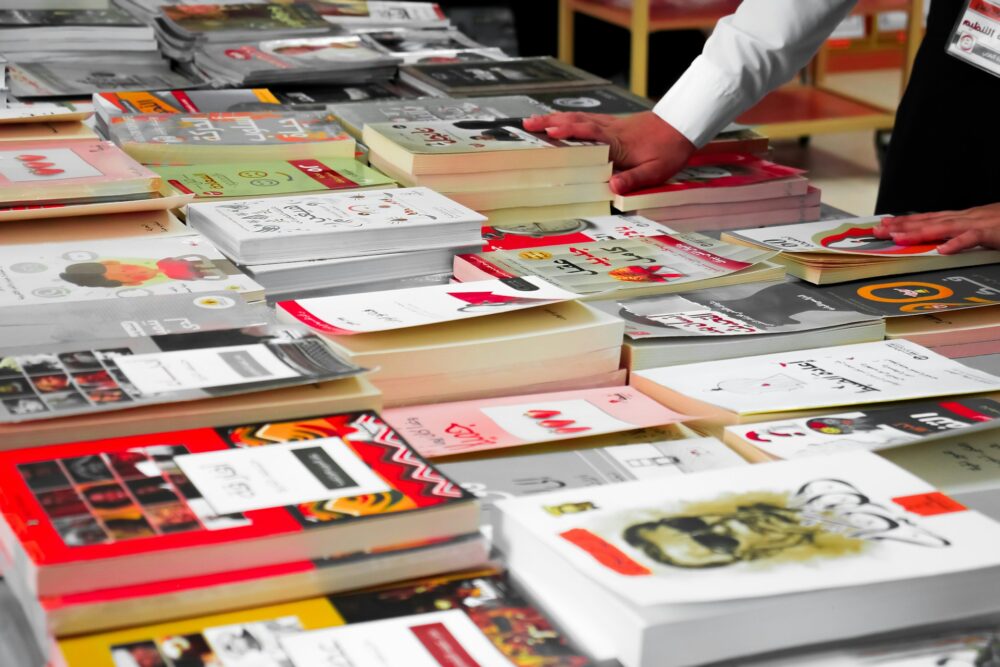Business
The First Frankfurt Book Fair Took Place 75 Years Ago
Frankfurt became the German book city for a reason. There was a “book fair” there as early as 1370. The city became an important book trading center in Europe – and remained so until the 17th century. The initial exclusive focus on Germany was already lost at the second Frankfurt Book Fair in 1950, when publishers from other European countries and the USA were also among the exhibitors

There was a “book fair” in Frankfurt as early as 1370. But the premiere of today’s Frankfurt Book Fair was not until 1949. In the Paulskirche, with 8,400 book titles.
The Frankfurt Book Fair is not particularly modest: it sees itself as the “world capital of ideas”, at least “once a year”. Then the world’s largest industry meeting of authors, publishers and reading public takes place in the spacious halls of the exhibition grounds.
It is considered an international model, as Peter Weidhaas, director of the Frankfurt Book Fair from 1975 to 2000, writes in his book “On the History of the Frankfurt Book Fair.” All newly founded book fairs have been based on the Frankfurt model – whether in London, Beijing, Moscow or Cairo, Buenos Aires or Bologna.
Frankfurt Book Fair 2024: Awkward book fair motto
In just a few weeks, from October 16th to October 20th, the 76th Frankfurt Book Fair will open its doors. The cumbersome motto is in English and has an exclamation mark within a word: “FBM24 is Read!ng – Read. Reflect. Relate.” In plain English, this could be: “Frankfurt Book Fair 2024 is reading – reading. reflecting. connecting.”
This year’s guest of honour is Italy : 91 Italian authors will appear in around 50 literary events. Mafia investigative journalist Roberto Saviano is also expected in Frankfurt, the book industry trade magazine “Börsenblatt” reported in June. However, he is not coming with the official Italian delegation, but at the invitation of his German publisher Hanser, ZDF and the book fair.
It started with 205 exhibitors
When the first German book fair after the war opened 75 years ago – on September 18th, 1949 – in Frankfurt’s Paulskirche, 205 German publishers came together. And the fair grew rapidly: in 2023, more than 4,200 exhibitors offered their literary products.
The furnishings in the early years were spartan, the exhibition stands were simple: two by two meters long, slanted wooden boards. In 2024, visitors will once again visit exhibition stands that are more comfortably furnished than many a living room.
Paulskirche as a representation
After the war, visitors felt they were in a “book frenzy” with “only” 8,400 titles on display, as the “Süddeutsche Zeitung” wrote at the time. In the pre-Corona year of 2019, however, around 390,000 book titles, digital media, audio books and e-books were presented.
In 1949, a representative building had to be found that had been rebuilt in the rubble of Frankfurt. So the book fair came to the Paulskirche. Later, a detailed hall plan was necessary – as a guide through up to 170,000 square meters of exhibition space. But in 2020, the coronavirus infected the world. The pandemic led to a digital book fair with no exhibitors at all.
Overshadowed by wars
In 2021, the publishers were back on site, albeit to a lesser extent than before the pandemic. In 2022, however, more than 4,000 exhibitors from 95 countries were counted, and visitor numbers also increased. In 2023, around 215,000 people came to the Frankfurt exhibition halls. But the otherwise inspiring literary event was marred by the horror of two wars – in Ukraine and the Gaza Strip.
Politically persecuted authors have repeatedly caused a stir at the book fair. In 2023, the Indian-British author Salman Rushdie received the Peace Prize of the German Book Trade. Rushdie said in Frankfurt that he saw one of the functions of literature in “creating beauty,” especially “in ugly times.” In 2024, the US journalist Anne Applebaum, an expert in Eastern European history, will be honored with the prize. The Russian human rights activist Irina Scherbakowa will give the laudatory speech.
“Meeting of pirates”
Frankfurt became the German book city for a reason. There was a “book fair” there as early as 1370. In the 15th century, Johannes Gutenberg developed the printing press with movable type in nearby Mainz. Frankfurt became an important book trading center in Europe – and remained so until the 17th century. It was not until the 18th century that Leipzig began to play a larger role.
“The Frankfurt fair largely degenerated into a meeting place for pirate printers and sank into complete insignificance in the 19th century,” says book fair historian Weidhaas. It was not until 1949 that Frankfurt booksellers succeeded in reviving the book fair tradition.
The initial exclusive focus on Germany was already lost at the second Frankfurt Book Fair in 1950, when publishers from other European countries and the USA were also among the exhibitors. In 2023, publishers from 95 countries came.
__
(Featured image by Eman Ali via Unsplash)
DISCLAIMER: This article was written by a third party contributor and does not reflect the opinion of Born2Invest, its management, staff or its associates. Please review our disclaimer for more information.
This article may include forward-looking statements. These forward-looking statements generally are identified by the words “believe,” “project,” “estimate,” “become,” “plan,” “will,” and similar expressions. These forward-looking statements involve known and unknown risks as well as uncertainties, including those discussed in the following cautionary statements and elsewhere in this article and on this site. Although the Company may believe that its expectations are based on reasonable assumptions, the actual results that the Company may achieve may differ materially from any forward-looking statements, which reflect the opinions of the management of the Company only as of the date hereof. Additionally, please make sure to read these important disclosures.
First published in DIE RHEINPFALZ. A third-party contributor translated and adapted the article from the original. In case of discrepancy, the original will prevail.
Although we made reasonable efforts to provide accurate translations, some parts may be incorrect. Born2Invest assumes no responsibility for errors, omissions or ambiguities in the translations provided on this website. Any person or entity relying on translated content does so at their own risk. Born2Invest is not responsible for losses caused by such reliance on the accuracy or reliability of translated information. If you wish to report an error or inaccuracy in the translation, we encourage you to contact us

-

 Cannabis2 weeks ago
Cannabis2 weeks agoKONOPEX Expo 2026: Celebrating Europe’s New Era of Legal Cannabis
-

 Biotech2 days ago
Biotech2 days agoVolatile Outlook for Enlivex Therapeutics as Investors Await Clinical Catalysts
-

 Impact Investing1 week ago
Impact Investing1 week agoInter IKEA Launches Electric Truck Fleet to Decarbonize Heavy-Duty Logistics in Italy
-

 Markets4 days ago
Markets4 days agoCotton Market Weakens Amid Demand Concerns and Bearish Trends














